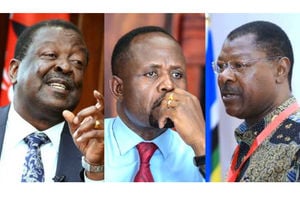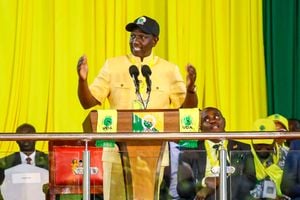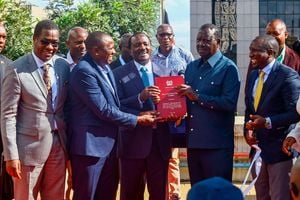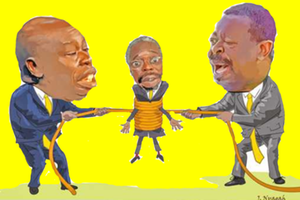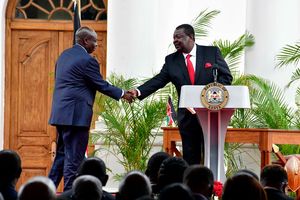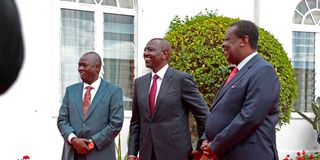
President William Ruto (centre), Deputy President Rigathi Gachagua (left) and Prime Cabinet Secretary Musali Mudavadi at State House, Nairobi on July 12, 2023.
President William Ruto is working on an elaborate plan to elevate Prime Cabinet Secretary Musalia Mudavadi’s political stature after it emerged that the Foreign Affairs Cabinet Secretary is ready to have his Amani National Congress (ANC) party fold into the ruling United Democratic Alliance (UDA).
The fresh move is, however, likely to unsettle Deputy President Rigathi Gachagua and his allies, particularly those from his Mt Kenya backyard.
UDA is planning to hold its grassroots polls between April 26 and August 24, to be followed by county and national elections by December, and the Nation has established a fresh push to have its willing affiliates in the Kenya Kwanza Alliance fold and join the yellow outfit.
Mr Mudavadi, according to insider sources, sees no problem convincing his ANC brigade to join UDA to strengthen the ruling party ahead of the 2027 elections, and to strengthen his bargaining power for future political prospects.
However, this move could still face resistance, especially in parts of his Western backyard, as some leaders view it as suicidal to them.
But even though Mr Mudavadi relinquished his ANC party leader’s post to Lamu Governor Issa Timamy after he was appointed PCS, he could benefit from one of the UDA deputy party leader’s slots, a position that would politically put him at par with Mr Gachagua.
Article 24 of the UDA constitution lists 39 officials of the party, where there is one party leader and three deputies, each in charge of policy and strategy, operations and programmes.
Mr Mudavadi recently hinted at another wave of the “political earthquake,” akin to the one which marked his official entry into President Ruto’s political fold ahead of the August 2022 elections.
Also Read: Walking the talk - The Natembeya politics, Western kingpin debate and Wetang’ula, Mudavadi play
Strengthen UDA
He also suggested a fresh move he said would help strengthen the UDA party.
“I want to make it clear to other ANC supporters, although I may not be the official party leader today, but as a strong member of ANC party, I must tell you frankly our conversation must be serious about how to strengthen the Kenya Kwanza administration and how to work very closely with the UDA which is the principal party in the coalition and to even engage in deeper debates.
“Don’t ask me which deeper debates. That’s for another day. Another earthquake is in the offing,” Mr Mudavadi asserted.
Senate Majority Whip Boni Khalwale, who is also the Kakamega senator, has publicly hinted at the possibility of Mr Mudavadi joining the UDA.
“Defection to UDA party loading. Musalia Mudavadi preparing his ANC party members for the announcement ('earthquake'),” Dr Khalwale said.
And Mr Mudavadi’s star seems to be rising fast, first after he was appointed PCS and later given a powerful Foreign and Diaspora Affairs Cabinet portfolio.
President Ruto has also not shied away from publicly expressing his confidence in Mr Mudavadi.
“My brother Musalia Mudavadi, on diplomatic affairs, we all agree we have the best diplomat in him. If I don’t get a chance for official foreign trips, most countries tell me if I send Mudavadi, that’s okay, he will do everything as I would have done myself. I thank you for your dedication to duty,” the President said recently.
It still remains unclear whether Mr Mudavadi would take up one of the UDA deputy leader’s slots himself or he would recommend a close ally given that he will still remain a State officer until 2027.
Even though he relinquished his ANC leadership role, most party leaders, including National Assembly Speaker Moses Wetang’ula are still clinging onto their party roles.
Mr Wetang’ula remains the Ford Kenya party leader even after he was elected Speaker.
Azimio leader Raila Odinga had called for his resignation, saying as a neutral arbiter at the National Assembly he should not belong to a political party.
Article 77 (2) of the Constitution states that an appointed State officer shall not hold office in a political party.
Politicians from Mt Kenya region allied to Mr Gachagua are said to be pushing for an amendment of the UDA constitution that provides for the three deputy leader positions to have a single deputy that will be reserved for the Deputy President.
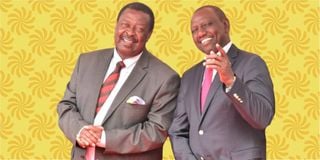
President William Ruto (right) and Prime Cabinet Secretary Musalia Mudavadi.
Clipping DP’s influence
A host of Mt Kenya leaders, including Nyeri Governor Mutahi Kahiga, a close ally of the DP, and Mr Gachagua’s Mathira MP Eric Mwangi, had last year claimed that having more than one deputy party leader could be a wider plan targeted at clipping the influence of Mr Gachagua in the 2027 and 2032 succession politics.
Governor Kahiga said the position of deputy party leader should be reserved for the DP and that the secretary-general’s position also be given to a leader from Mt Kenya region.
“There must be a party leader and a deputy party leader. The rest can be whatever they want,” he said.
Yesterday, Mr Kahiga did not respond when reached by Nation on the matter.
“We only have one president, who is the party leader, and one deputy president, who should be the only deputy party leader,” he had said earlier.
The demand to reserve the position for Mr Gachagua was triggered by Dr Khalwale’s remarks after he told the DP to prepare for a western region takeover of State House at the end of Dr Ruto’s presidency in 2032.
“Mr Gachagua should listen to me. Whether he likes it or not, 2032 is time for a Luhya presidency. Just like president Ruto took over from Uhuru Kenyatta, so shall it be when a Luhya will be inheriting President Ruto,” he said.
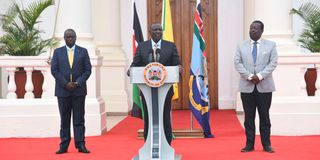
Deputy President Rigathi Gachagua (left), President Dr William Ruto and Prime Cabinet Secretary Musalia Mudavadi at State House in Nairobi on September 27, 2022.
UDA Secretary-General Cleophas Malala told Nation when the party announced its elections that “a technical committee would be put in place to take proposals from members on possible clauses for amendment”.
Yesterday, Belgut MP Nelson Koech reiterated that the UDA constitution anticipates that each of the deputy positions in the party shall have three deputies for policy and strategy, operations and programmes.
“Indeed, Article 24 of the UDA constitution anticipates there shall be three deputy party leaders, three deputy chairpersons, three deputy secretaries-general, three deputy treasurers and three deputy national organising secretaries.
“There is no need to overemphasise the triune nature of deputy party leader position when it is a cross-cutting phenomenon and when as things stand the position is only occupied by one office holder despite the constitution providing otherwise,” Mr Koech told Nation.
He said that splitting the posts has ensured that UDA has 39 national officials and in so doing the party is able to have a representative regional outlook.
During the President Daniel arap Moi’s last days in office ahead of the 2002 elections, Mr Mudavadi, former president Uhuru Kenyatta, Wiper leader Kalonzo Musyoka, and coast politician Katana Ngala were chosen as the four Kanu vice-chairmen, representing their various regions in a bid to mobilise votes.
ODM leader Raila Odinga’s party also has two deputies — Hassan Joho from Coast and Wycliffe Oparanya from Western region.
If UDA is to adopt the three deputies and one goes to Western, for regional balance and vote mobilisation, it is likely another slot would go to the Coast region.
There has been talk that Mr Odinga, who has secured the support of President Ruto for his African Union Commission chairmanship bid, could reciprocate by backing him for a second term after formation of a strong united Western Kenya bloc akin to the 2007 ODM formation.
Mr Odinga, Mr Mudavadi and President Ruto, among other key ODM leaders, formed the Pentagon which drove their 2007 election campaigns.
Mr Mudavadi, however, told Nation in a recent interview that “it’s far too early to discuss strategies for elections that are more than three years away”.
“The Kenyan political landscape is constantly evolving, and the focus right now should be on addressing the immediate challenges facing our nation. The Kenya Kwanza administration was elected on a platform of social and economic transformation. It remains committed to tackling issues that matter for majority of Kenyans, regardless of their region or ethnicity,” he said.
Asked whether he was keen on serving the country as future Deputy President or President, he said: “My primary focus is on fulfilling my current mandate as Prime Cabinet Secretary and Cabinet Secretary for Foreign and Diaspora Affairs.”
“These roles are incredibly demanding, requiring my full attention and dedication. I am focused on supporting the President’s agenda through greater coordination of government programmes to improve service delivery to our people, at all levels across all regions. There is simply too much on my plate to be fantasising about hypothetical roles in the future,” he added.

